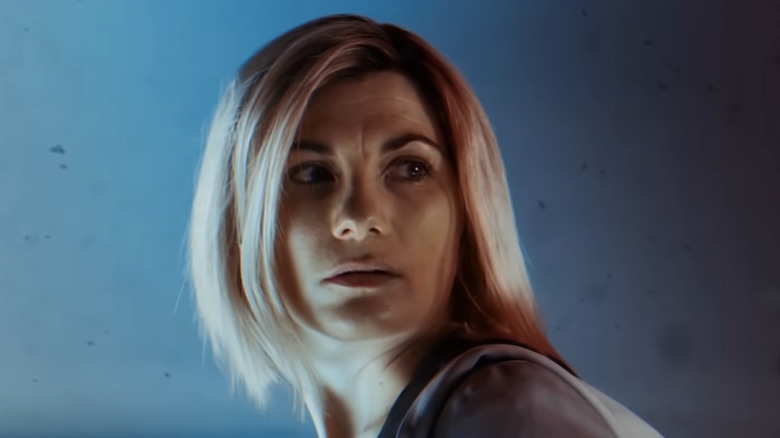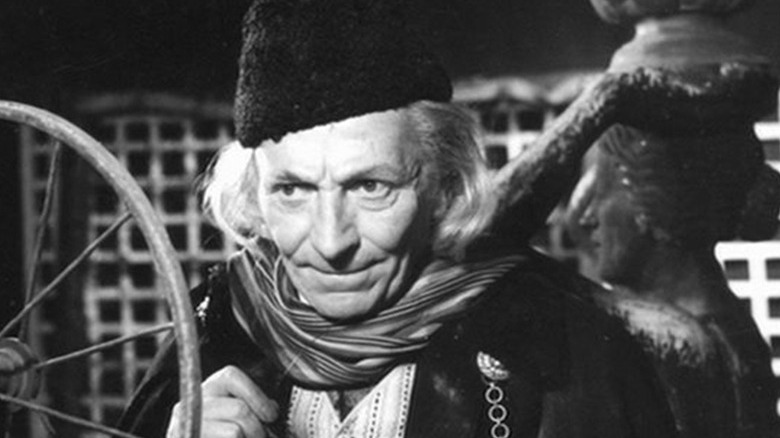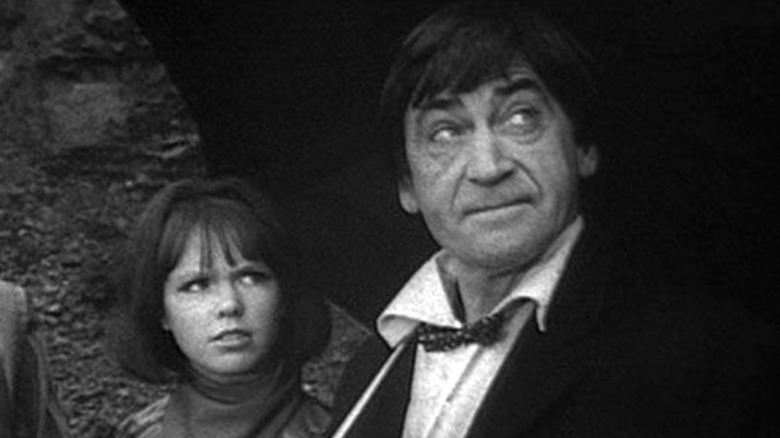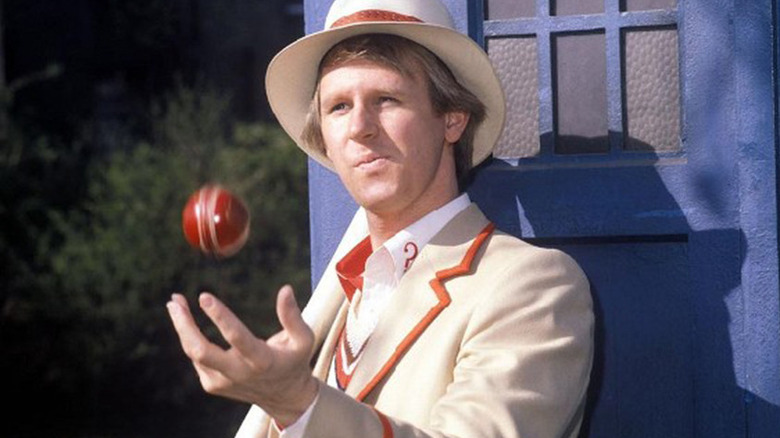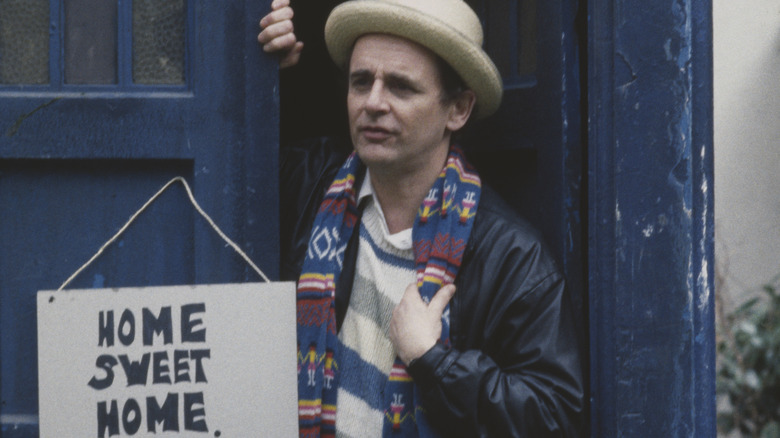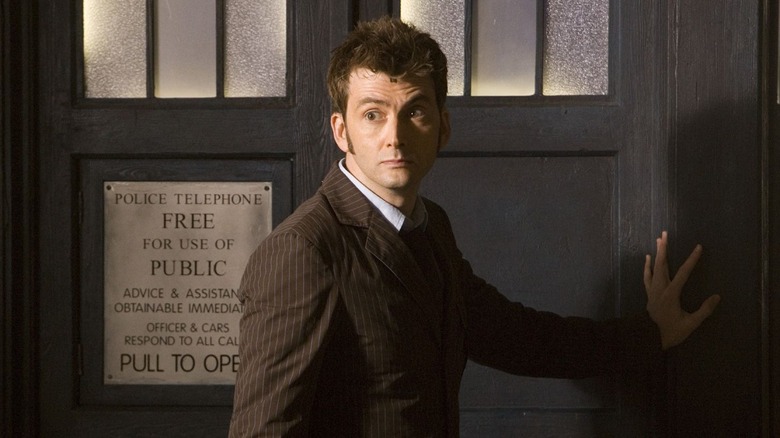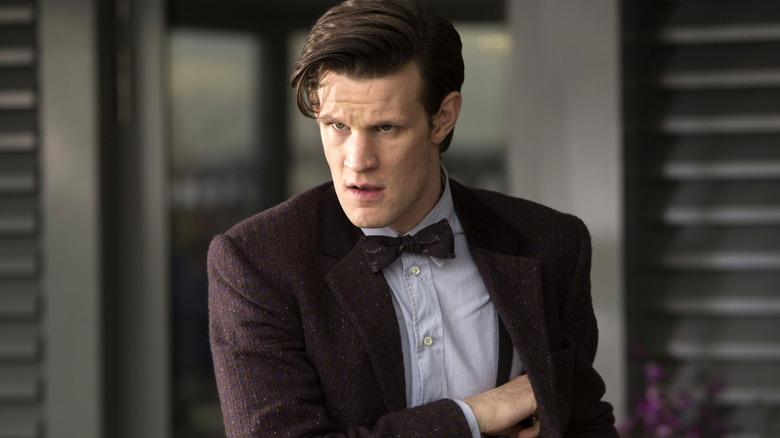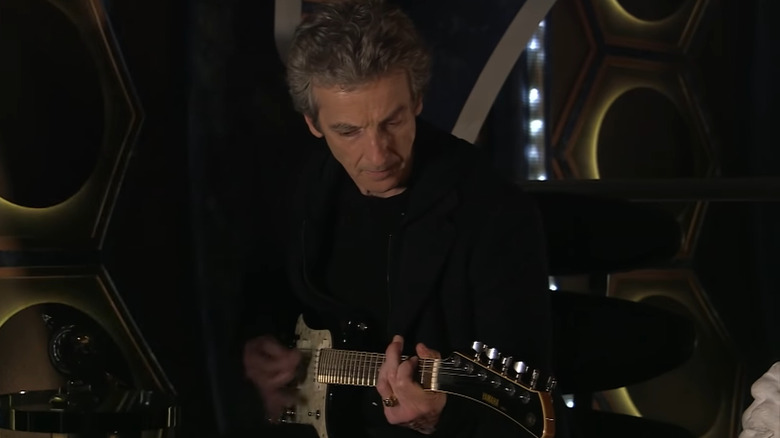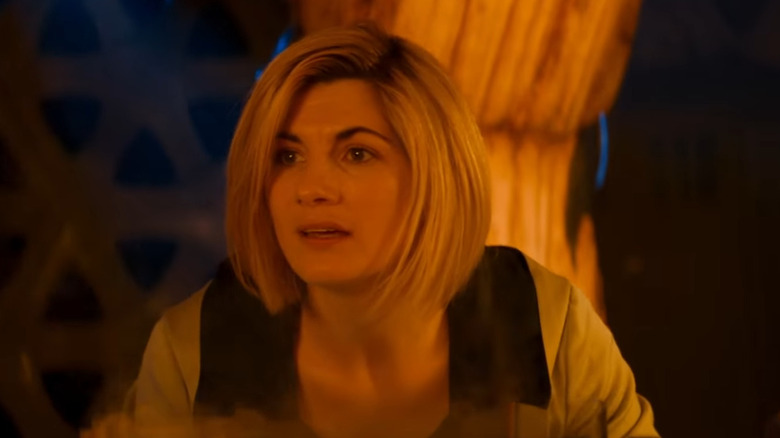The Real Reason 8 Out Of The 13 Doctor Who Actors All Left After 3 Seasons
This Halloween, Jodie Whittaker's final season as the Thirteenth Doctor on "Doctor Who," got off to a creepy, cataclysmic, explosive start with its season premiere, "The Halloween Apocalypse." Dubbed "Doctor Who: Flux," the Thirteenth Doctor's final season promises six episodes that make up one, massive story arc. It's a remarkably fitting way to go out — not because the Thirteenth Doctor is leaving after the 13th season beginning on Halloween (though that is a fittingly spooky coincidence) — but because Whittaker's following a long tradition of actors portraying the Doctor for just three seasons.
Out of the 13 Doctors (15 if you count John Hurt's one-off War Doctor for the 50th anniversary special, "The Name of the Doctor," and Jo Martin's mysterious two-off "Fugitive Doctor" in a pair of episodes in the 12th season), eight of them have called it a day after three seasons. Four of the original Doctors departed after three seasons and four of the modern Doctors left after the same number. In fact, it's become so common, fans refer to it as an unofficial three-season "rule." But why is three so often the magic number? That's not easy to say because the fact is no two actors stay or leave for the same reasons, regardless of how many seasons they put in. And since they aren't actually following a mysterious rule, this is the real reason why eight of the 13 Doctors have bid farewell after three seasons.
First Doctor William Hartnell's health was ailing
When "Doctor Who" first began back in 1963, the BBC tapped veteran British actor William Hartnell to play the First Doctor. Though he was only 55 when he got the role, Hartnell portrayed an abrasive, seemingly frail, much older Doctor. Being a Time Lord, of course, meant that he was far tougher than he looked, but the frailness wasn't always an act. Hartnell suffered from then-undiagnosed arteriosclerosis, and as the years went on, the demands of the show took their toll on his health.
In 1983, Doctor Who Magazine #83 contained an interview with Hartnell's widow, Heather Hartnell, about his time on the show. He absolutely loved it, she assured fans, and left "purely because of his ill health." In fact, leaving broke his heart. "Having told the press that it was going to run for five years, he was determined to play it for five years. But he could not remember his lines, plus his legs were beginning to give way at times."
Of course there were rumors that he also left in 1966 because he clashed with the show's new team, though officially the BBC only says that, "A combination of ill-health and changing production team influenced William Hartnell's decision to retire from the role." Not wanting to cancel their hit, the BBC hired actor Patrick Troughton to take over as the Second Doctor, beginning the painful Time Lord regeneration that's allowed "Doctor Who" to continue for almost 60 years.
Second Doctor Patrick Troughton didn't want to be typecast
Though Hartnell left after just three years, it wasn't until the Second Doctor's departure that the three-season rule (very much unofficially) began to take shape. When Patrick Troughton took over as the Doctor in 1966, he transformed the Time Lord from a cantankerous old man, to a bumbling, comic "Cosmic Hobo." While playing the Doctor was a dream role, Troughton knew that it couldn't go on for too long or it would trip up his career, forever tying him to Britain's most famous time traveler.
In a 1986 interview with KETH, Troughton looked back fondly on the role, saying that "It was a lovely part to live with for three years." He went on to talk about how much happier he was to make "Doctor Who" appearances for American fans than British ones. That wasn't because there was anything wrong with the fans in his native country, but he wanted some distance from the Doctor back home. "Back in England, it's a mistake for any character actor to become associated too much with one part, otherwise you're stymied."
That doesn't mean he didn't question his decision to leave such a beloved character behind, "but you can't stay in one job forever." Of course, not every Doctor agreed with him. When Jon Pertwee took over as the Third Doctor in 1970, he stayed for five years. And Tom Baker's Fourth Doctor began in 1975 and lasted a whopping seven seasons.
Fifth Doctor Peter Davison was itching to move on
When one of the most beloved Doctors of all time, Tom Baker, finally left the show in 1981, it fell to 29-year-old Peter Davison to fill his shoes. Though thrilled to take on the role, being the then-youngest actor to tackle the role did play a part in Davison only staying for three seasons. Patrick Troughton famously advised Davison when he took on the role to only play it for a short time. Davison, it turned out, took that to heart.
In a 2003 interview at sci-fi convention Gallifrey One, Davison was asked whether he was glad he followed the advice. "Oh yes," he replied without hesitation. "I very definitely had a choice to do a fourth year of 'Doctor Who' or leave after three, and it was a close call." When it came down to it, he just wasn't happy with his second season.
"I had to make the decision [to leave] ridiculously early," Davison told Den of Geek, "even before I did the third season. By that time, it was irreversible." Of course, he did admit that if he'd gotten more stories like the third season's "The Caves of the Androzani," he might have stayed. But ultimately, he was "still quite young" and envied other actors his age who could jump from role to role while he played just one. "Maybe I would have done another year," he mused, "but I know that I might have regretted it."
Seventh Doctor Sylvester McCoy closed out the original run
As the Seventh Doctor and the final actor to portray the Time Lord in the series' original run, Sylvester McCoy's reasons for leaving were pretty cut and dry. The show was dropped in 1989 at the end of this third season. "Doctor Who" had been running for 26 seasons, and just didn't have the same pull that it once had. Plus, some at the top of BBC absolutely hated it and wanted it gone.
It first went on an 18-month hiatus in 1985 when BBC One's Controller, Michael Grade tried to get rid of it. As the BBC noted in a 2013 retrospective, Grade declared that he "thought it was rubbish. I thought it was pathetic. You just sit and laugh at it." When it came back in 1986, Sixth Doctor Colin Baker was soon booted and McCoy took his place in 1987. It was then scheduled against the extremely popular soap, "Coronation Street," which meant that "Doctor Who," an insider told the BBC, was "scheduled to death".
The show, though, was never officially canceled, and the BBC trotted the Doctor out every now and then. McCoy, though, suggested in a 1996 interview at the Gallifrey One convention that this "wasn't any kind of Machiavellian plan by the people at the top."
Tenth Doctor David Tenant went out on his own terms
When "Doctor Who" was revived in 2005 after 16 years, the BBC decided not to reboot the program, but instead continue on from where it left off. Christopher Eccleston became the Ninth Doctor (Paul McGann briefly appeared onscreen as the Eighth Doctor in a one-and-done made-for-TV American movie), only to move on after a single season. That's when David Tennant stepped in as the fan-favorite Tenth Doctor.
Though officially Tennant only stayed for three seasons, he held onto the role for four years, filming a series of specials after his final season before he passed on the torch and regenerated into Matt Smith's Eleventh Doctor. Tennant was really the first Doctor to explain why three seasons just feels right, making clear that it let him be a master of his own fate.
"I think it's better to go when there's a chance that people might miss you," he said when he announced his departure (via the BBC), "rather than to hang around and outstay your welcome." If he didn't leave while he could, Tennant suggested, he'd never find the will to let go of the role again. Plus, he and then-showrunner (and soon to be again) Russell T. Davies decided that they should leave together — though Tennant did waver on the decision. "We had dinner and chatted about it a few years ago," Davies told The Sunday Times back in 2009. "It just felt right."
Eleventh Doctor Matt Smith needed a break
When Matt Smith took over as the Eleventh Doctor in 2010, the 26-year-old officially bumped Peter Davison out as the youngest Doctor ever. That, though, didn't seem to have as much of an impact on his leaving after three seasons as it did Davison. Though Smith didn't take on the role with a specific plan in place for when he would leave, there was, he told The Hollywood Reporter, something that just seemed right about leaving after the show's 50th anniversary.
Plus, being the Doctor is a heavy burden to carry. "It's a very intense process," he shared. "The line-learning is really hard, and you have to live away from home for nine or 10 months a year. I love the show, and it wasn't an easy choice to come to, but it's the right time for both of us."
When a fan asked whether Smith left the role too soon at a 2016 New York Comic Con panel, Alex Kingston who played the Doctor's wife, River Song, defended him. "There is only a certain amount of time that anyone can play the Doctor," she said, "because you get burnt out." Besides the sheer amount of work that goes into being in every one of the episodes, there's also the overwhelming media appearances to get through. "It's a shame when [the Doctors] go," she concluded as Smith nodded in agreement, "but for their own health, they have to stop."
Twelfth Doctor Peter Capaldi left before his love turned to hate
With Matt Smith's departure in 2013, showrunner Steven Moffatt brought Peter Capaldi in to replace him as the Twelfth Doctor. It was a dream come true for the 55-year-old actor, who, he told Entertainment Weekly, had been a fan of the show since its earliest days. In fact, he was such a huge Whovian that when he was offered the chance to try for the Eighth Doctor, he turned it down. "I loved the show so much," he explained, "and I didn't think I would get it, and I didn't want to just be part of a big cull of actors."
Fortunately, he did come back to put his own stamp on the Doctor. And really, it was that love of the show and the character that convinced him it was time to leave after three seasons. When talking about his final season on "The Graham Norton Show," Capaldi said he'd just wrapped up filming for it — and it had lasted a grueling 10 months. "Shoot day 205 was last Friday," he clarified, "so we're all pretty exhausted."
"Doctor Who is a great job," he continued, "but it's a bit of a television factory," He wanted to leave while he was on top, doing his best work with it. He worried that staying longer would risk having that love turn to hate and the quality of his Doctor decreasing. "I just figure," he concluded, "while you're enjoying it, leave."
Thirteenth Doctor Jodie Whittaker had a plan from the start
When Jodie Whittaker took over as the Thirteenth Doctor in 2018, she finally shattered the "Doctor Who" glass ceiling and portrayed the first female Doctor. Time Lord regeneration isn't relegated to just one gender, so it seems kind of silly that the Doctor was reborn as male 12 times in a row. Whittaker isn't just the most recent Doctor — she's also the most recent to portray the Doctor for just three seasons. Unlike her predecessors, the Thirteenth Doctor's actor, it turns out, had this planned from the beginning. According to the BBC, showrunner Chris Chibnall explained that he and Whittaker made a "three series and out" pact. "So now our shift is done, and we're handing back the Tardis keys."
The actress, though, admitted to Entertainment Weekly that she was tempted to stay on regardless of their agreement. "Wonderfully, going into it, it didn't feel like either of us were being held to our own conversation (about leaving after three seasons)," she shared. But, she continued, "there was just something about it that was like, 'I think it is the right time.'"
Ultimately, as so many Doctors have learned before her, it's too late for regrets . Whittaker has wrapped her six-episode third season, and all three specials that are to follow it, including the BBC's centennial "Doctor Who" special airing in 2022. So we're all set for a Fourteenth Doctor by the show's 60th anniversary in 2023. As to whether they'll follow the "three year rule" or go their own way, only time will tell.
